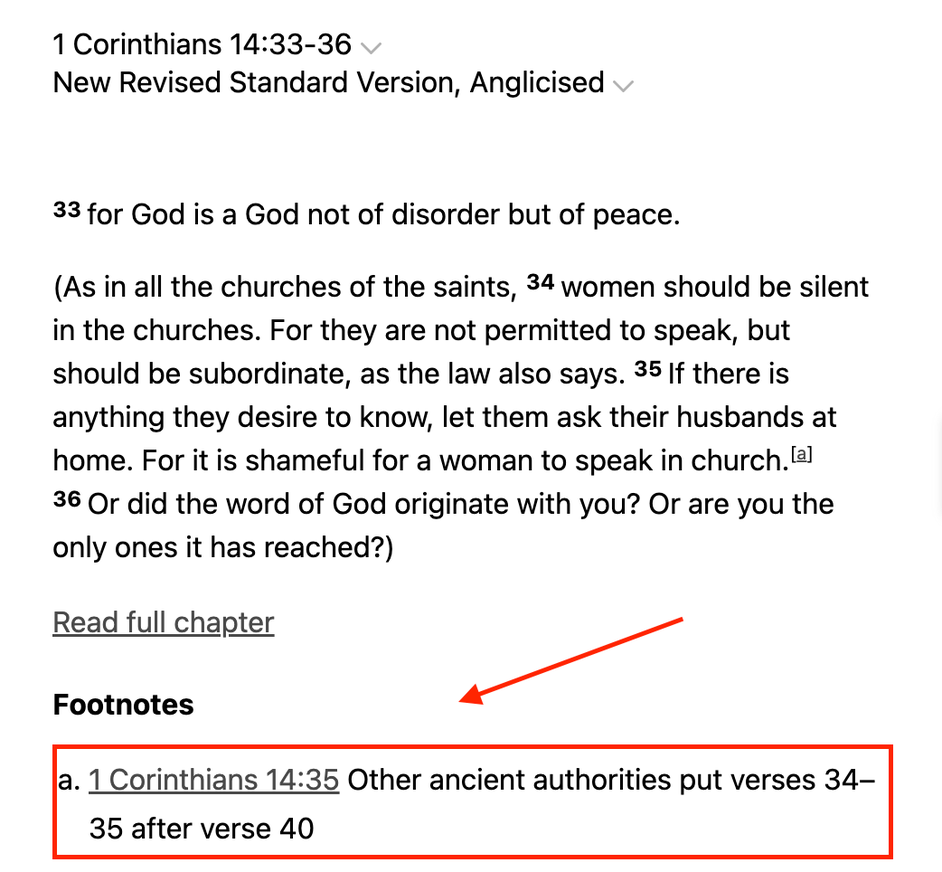34 Women should be silent in the churches. For they are not permitted to speak but should be subordinate, as the law also says. 35 If there is something they want to learn, let them ask their husbands at home.[a] For it is shameful for a woman to speak in church. (1 Corinthians 14: 34-35, NRSVUE)
Yeah, this week's post starts with this. I'm offended and pissed, and I'm not a woman. Here are a few gems that especially anger me:
- Women should be silent...
- should be subordinate...
- let them ask their husbands at home...
This, ladies and gentlemen, is what we call a clobber passage.
Clobber passages are Bible verses that conservative interpreters weaponize by presuming the text's meaning is self-evident.
This removes all context, background, history, and experience from helping us understand the layers behind a clearly complex passage.
As the name implies, it's also important to note that clobber verses are used to beat another person into submission. In many ways, clobber verses are 'kill switches' to end what could be healthy and productive dialogue. Instead of trying to empathize and understand the experience of an LGBTQIA+ Christian trying to navigate where they belong spiritually, we just shut the conversation down. Instead of walking with them and putting ourselves in their shoes, a clobber verse allows the stupid opportunity to say something like,
"13 If a man lies with a male as with a woman, both of them have committed an abomination; they shall be put to death; their bloodguilt is upon them." (Leviticus 20:13, NRSVUE)
Mind you; it's always those that a clobber passage does not apply to who are the first to weaponize such a text. For example, I've never heard a woman say, "I'm not going to speak in church because 1 Corinthians 14 clearly says..." But I've heard plenty of men say, "We may not like it, but it's in the Bible, and it's God's word." Ironically, I have yet to meet the pastor or church leader with the gall to try and apply this passage in their congregation. Yet, the point remains those who clobber verses don't apply to are generally the ones to weaponize them the most.
Is Paul Teaching Women to Be Silent?
As a quick refresher, last week in Echoes of Equality: The Women's Revolution in Paul's Ministry, I discussed the 3 Pauls we see in the New Testament: there's the Radical, the Conservative, and the Reactionary Paul.
In last week's article, we looked at several examples processing through the words and actions of the Radical Paul. This week and next, we'll examine the other extreme, the Reactionary Paul. From the outset, I want to put my cards on the table; I can't reconcile the Radical and the Reactionary Paul. Either Paul was dealing with some undiagnosed mental or personality issues, or only one of these is the real Paul.
In the words of Eminem, "Will the real Apostle Paul please stand up?"

This is to say, no, I don't believe this is the actual Apostle Paul saying this about women remaining silent in the church. However, the real Paul penned the letter of 1 Corinthians. Did I completely lose you?
To say it another way. Yes, the letter of 1 Corinthians is an authentic Pauline letter, but I don't think the original author wrote 1 Corinthians 14:33-36 of this letter. Here are four reasons why I don't think Paul is telling women to be silent in church.
An Appearance By the Radical Paul in 1 Corinthians 7
What's unique about 1 Corinthians is we actually get to see both the Radical and Reactionary Paul appear in the same letter. We've seen the Reactionary Paul and will talk more about it below. Before we do let's pause to show where the Radical Paul appears.
1 Corinthians 7: 25-35 (NRSVUE)
25 Now concerning virgins, I have no command of the Lord, but I give my opinion as one who by the Lord’s mercy is trustworthy. 26 I think that, in view of the impending[a] crisis,[b] it is good for you to remain as you are. 27 Are you bound to a wife? Do not seek to be free. Are you free from a wife? Do not seek a wife. 28 But if you marry, you do not sin, and if a virgin marries, she does not sin. Yet those who marry will experience distress in the flesh, and I would spare you that. 29 I mean, brothers and sisters, the appointed time has grown short; from now on, let even those who have wives be as though they had none, 30 and those who mourn as though they were not mourning, and those who rejoice as though they were not rejoicing, and those who buy as though they had no possessions, 31 and those who deal with the world as though they had no dealings with it. For the present form of this world is passing away.
32 I want you to be free from anxieties. The unmarried man is anxious about the affairs of the Lord, how to please the Lord, 33 but the married man is anxious about the affairs of the world, how to please his wife, 34 and his interests are divided. And the unmarried woman and the virgin are anxious about the affairs of the Lord, so that they may be holy in body and spirit, but the married woman is anxious about the affairs of the world, how to please her husband. 35 I say this for your own benefit, not to put any restraint upon you but to promote good order and unhindered devotion to the Lord.
The topic in verses 25-28 is virginity. It's thrilling, I know. But bear with me. Look at how Paul balances his instructions equally for men and women. In verses 25-27, he addresses male virgins, and then in verse 28, he addresses female virgins, giving both the same instruction.
In verses 32-35, Paul addresses abstinence, and again, there's a balance. In verse 33, the husband is anxious about how to please his wife. Then, in verse 34, he addresses a wife and her concern for pleasing her husband. There's equality in Paul's instructions throughout 1 Corinthians 7.
Marcus Borg and John Dominic Crossan go so far as to say:
"It is impossible not to recognize the deliberate balancing of female/male and male/female throughout that chapter (1 Corinthians 7). What is right for one is right for the other; what is wrong for one is wrong for the other. Wife and husband are equal in the family." (The First Paul: Reclaiming The Radical Visionary Behind the Church's Conservative Icon, p. 49, Kindle Edition)
So...How do we go from a Paul who makes it a point to emphasize equality between husbands and wives to the Paul of 1 Corinthians 14 telling women to be silent?
Three Reasons Why Paul is Not the Author of 1 Corinthians 14:33-36
SPOILIER alert: For my fundamentalist/evangelical friends out there, cover your eyes. What I am about to write is not something you will want to read. All 3 of my reasons argue that this section of 1 Corinthians 14 was not initially in the letter but was added later in church history. OMG, but what about infallibility and inerrancy?! I... don't...know those aren't views that I believe about the Bible.
Reason 1: Context Matters
What is happening around this text in 1 Corinthians 14? Verses 26 through 32 discuss prophecy in the context of corporate worship gatherings. If we skip verses 33-36 and pick back up in 37, what are the last few verses of the chapter discussing? Prophesy in the context of corporate worship gatherings. Queue the GIPHY:

Why does this matter? It matters because the continuity of this chapter works better without verses 33-36 than it does with them. Context matters because, looking at the chapter as a whole, one of these things is not like the other, and it's this oddly placed 'tell women to be quiet' passage.
Reason 2: The Passage is Not In Our Earliest Manuscripts
If you thought reason 1 was mind-blowing, buckle up because reason 2 is even crazier. 1 Corinthians 14:33-36 is not in the earliest manuscripts of this letter. In fact, all of our earliest Greek manuscripts place these verses after 14:40 in an entirely separate paragraph. The NRSV even put 14:33-36 in () with a note about where the passage was historically placed (sadly, the NRSVUE did not keep this note).

Reason 3: 1 Corinthians 14 Contradicts 1 Corinthians 7
As mentioned above, either Paul had some undiagnosed mental or personality illness, or the Paul of Acts 16, Romans 16, and 1 Corinthians 7 is not the same as the Paul in 1 Corinthians 14. How can we explain in one chapter that Paul explicitly goes out of his way to teach equality between men and women within a marriage, and then seven chapters later, he blows up everything he says? The shortest path between two points is a straight line; in this case, the straightest line is this isn't the same person.
I can only offer conjecture here because we don't know. For the reasons outlined throughout this article, some scribe added 14:33-36 to the margins of a manuscript, and over time, what was in the margins became part of the text.
I'll go even one step further. I think 1 Corinthians 14:33-36 summarizes 1 Timothy 2:8-15. But alas, we'll save that passage for next week.
_______________________
Thanks for stopping by and reading this article! If my work has served you or you want to contribute to creating authentic faith connections, consider becoming an Authentic Faith Advocate.
Thanks for stopping by and reading this article! If my work has served you or you want to contribute to creating authentic faith connections, consider becoming an Authentic Faith Advocate.
